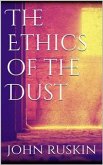It may be proved, with much certainty, that God intends no man to live in this world without working: but it seems to me no less evident that He intends every man to be happy in his work. It is written, "in the sweat of thy brow," but it was never written, "in the breaking of thine heart," thou shalt eat bread; and I find that, as on the one hand, infinite misery is caused by idle people, who both fail in doing what was appointed for them to do, and set in motion various springs of mischief in matters in which they should have had no concern, so on the other hand, no small misery is caused by over-worked and unhappy people, in the dark views which they necessarily take up themselves, and force upon others, of work itself. Were it not so, I believe the fact of their being unhappy is in itself a violation of divine law, and a sign of some kind of folly or sin in their way of life. Now in order that people may be happy in their work, these three things are needed: They must be fit for it: They must not do too much of it: and they must have a sense of success in it—not a doubtful sense, such as needs some testimony of other people for its confirmation, but a sure sense, or rather knowledge, that so much work has been done well, and fruitfully done, whatever the world may say or think about it. So that in order that a man may be happy, it is necessary that he should not only be capable of his work, but a good judge of his work.The first thing then that he has to do, if unhappily his parents or masters have not done it for him, is to find out what he is fit for. In which inquiry a man may be very safely guided by his likings, if he be not also guided by his pride. People usually reason in some such fashion as this: "I don't seem quite fit for a head-manager in the firm of —— & Co., therefore, in all probability, I am fit to be Chancellor of the Exchequer." Whereas, they ought rather to reason thus: "I don't seem quite fit to be head-manager in the firm of —— & Co., but I daresay I might do something in a small green-grocery business; I used to be a good judge of peas;" that is to say, always trying lower instead of trying higher, until they find bottom: once well set on the ground, a man may build up by degrees, safely, instead of disturbing every one in his neighborhood by perpetual catastrophes.
Bitte wählen Sie Ihr Anliegen aus.
Rechnungen
Retourenschein anfordern
Bestellstatus
Storno









